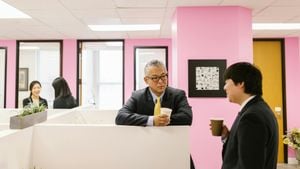Shinjuku Gyoen National Garden has recently unveiled an impressive mural celebrating accessibility, contributing significantly to the awareness of inclusivity within Japan's renowned urban parks. Located centrally within the garden, the mural encapsulates the garden's commitment to providing equitable access to all visitors, including those with disabilities.
The opening ceremony drew considerable attention from various community members, local officials, and artists, all eager to witness the impact of this initiative. The mural's vibrant colors and design embody the spirit of partnership between the government and local artists, aiming to promote awareness around accessible pathways and facilities.
According to local councilor Yamada Satoshi, who spoke at the event, "This mural is not just about beautification; it serves as an important reminder for us to continue improving our public spaces for everyone. Accessibility is not merely a feature—it's fundamental to inclusivity."
The Shinjuku Gyoen National Garden, recognized as one of Tokyo's largest and most beautiful parks, plays host to visitors from both Japan and around the globe. The newly unveiled mural aligns with the garden's history, enhancing its longstanding commitment to providing visitors with enchanting natural beauty accessible to all.
Artist Akira Nishimura, who was commissioned to create the mural, noted the importance of the work. "Art should speak to everyone. Accessibility should not be seen as separate from beauty. This mural combines both, demonstrating how art can raise awareness and invite dialogue around accessibility," he shared during the ribbon-cutting ceremony.
The backdrop of the garden adds layers of meaning to the mural. Shinjuku Gyoen boasts centuries-old trees, traditional Japanese landscapes, and expansive green lawns, making it the perfect canvas for this project. The integration of artistry and nature aims to create inspiring connections, encouraging visitors to think about the paths they traverse.
The decision to focus on accessibility came as part of the city’s broader initiative to improve facilities for people with disabilities. Local authorities have been progressively investing resources to revamp parks, walkways, and public transport systems to cater to individuals' varying needs.
Official reports from the Tokyo Metropolitan Government suggest extensive feedback from community consultations surrounding the project. Many expressed their desire for more inclusive public spaces. With nearly 1.5 million visitors annually, Shinjuku Gyoen's new mural enhances the environment, establishing expectations for future enhancements to the grounds.
During the event, speakers spoke passionately about the significance of civic consciousness, with one attendee, Miss Aoki, stating, "Such initiatives put the spotlight on the conversations we need to have about accessibility. Every step toward inclusion is worthwhile, and this mural is just the beginning."
Following this vibrant celebration, officials announced plans for additional projects focused on community engagement and accessibility enhancements across other public parks throughout Tokyo.
The initiative aligns with Japan's goals outlined under the United Nations Convention on the Rights of Persons with Disabilities, emphasizing the rights of access to public spaces for individuals with disabilities. This initiative is part of Shinjuku Gyoen's pledge to continually be at the forefront of accessibility awareness and innovation.
Concluding the event, participants were encouraged to document their experiences and share how the new mural inspired conversations about inclusivity with friends and family. The mural is scheduled to be accompanied by informational plaques detailing the meanings behind the artwork and details on the efforts city's authorities undertake toward ensuring public space usage for everyone.
The Shinjuku Gyoen National Garden accessibility mural not only beautifies the park but also sends out ripples of change, beckoning reflections on inclusion and accessibility within society. "Art must challenge us to rethink how we view our spaces and each other," concluded Nishimura, encapsulating the event’s ethos as attendees departed, inspired to advocate for greater inclusivity.



